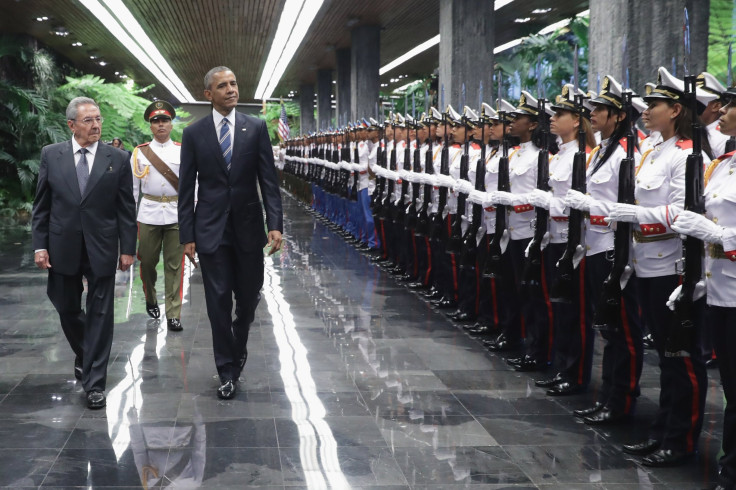Castro Hardens Rhetoric, Warns Cubans To Be Alert To US Intentions

President Raul Castro warned Cubans on Saturday that the United States is determined to end Cuba's socialist revolution despite restoring relations and a visit by U.S. President Barack Obama, saying one-party Communism is essential to defend the system.
"We must be alert, today more than ever," Castro said, speaking in front of a giant portrait of his brother Fidel Castro at the inauguration of the Communist Party's first congress in five years.
He called Obama's desire to end U.S. sanctions on Cuba a change of "method," in reference to efforts by Washington to bring political change to Cuba ever since the Castro brothers toppled a pro-American government in 1959.
Obama and Castro announced in December 2014 they would end decades of enmity and normalize relations. Obama made a historic trip to the island last month but angered the government with calls for more political freedom and democracy in the one-party state.
Castro and his lieutenants, many of them in their 70s and 80s, faced some discontent ahead of the congress among younger members who are critical of their slow delivery on promised economic reforms in the past five years and a lack of transparency on discussions.
Castro said the reforms should be implemented faster but said Cuba was not moving toward capitalism, citing China and Vietnam as models, while emphasizing that social ownership and cooperatives were mostly preferable to private property.
Castro said he remained convinced of the benefits of improved relations with the United States and said Cuba was committed to the diplomatic thaw. But he made clear he did not believe Obama's promise that the United States would not impose political or economic change on Cuba.
"The goals are the same, only the methods have changed," Castro said, adding that U.S. migration policies that encourage Cubans to defect were "a weapon against the revolution."
"These practices do not correspond to the declared change in policy towards Cuba, and cause difficulties in third countries," he said.
Migration has surged since the 2014 detente as Cubans take advantage of a U.S. policy that grants them citizenship as soon as they arrive. Bottlenecks of migrants in transit have formed in Central America.
Cuba's top leaders started their careers as young guerrilla fighters who overthrew a U.S. backed government in 1959, and a few years later repelled the U.S.-backed Bay of Pigs invasion — which the party congress is timed to commemorate.
Castro said the one-party system is the greatest defense against Washington's past attempts to dominate Cuba.
"If one day they manage to fragment us, that would be the beginning of the end of the revolution, of socialism and independence in our homeland," he told 1,000 delegates gathered for the congress.
Castro is 84, and his top lieutenant in the party, José Ramón Machado Ventura is 85.
Castro is due to retire as president in 2018, and by the end of the four-day congress it will be clear whether he remains as party leader until 2021 or whether somebody younger takes over the leadership.
Founded in 1965, the Communist Party is seen as more powerful in Cuba than the government. It was formally led by Fidel Castro until 2011, although his younger brother had effectively taken command several years earlier.
© Copyright Thomson Reuters 2024. All rights reserved.











